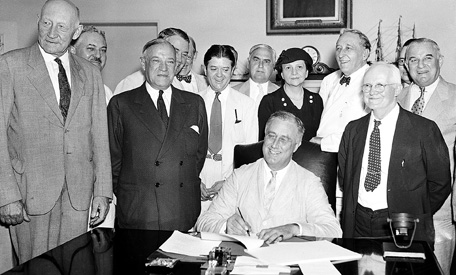“Socialism” and forced charity

Erik’s post about SSI reminded me that I’ve been meaning to post something about the general subject of the long running opposition, at least in theory, among so many Americans to Social Security and other safety net programs.
When the Social Security Act was passed in 1935, median income for families and single-person households in America was $1,070 per year. This is $20,282 in 2021 dollars. Fully a third of all American families/households were living on less than $14,785 per year, in 2021 dollars. So half of all American families were living at what today would be well below the poverty line, which is currently $26,200 for a family of four, and a third were making barely half the current poverty line income, or in many cases far less.
Obviously under such economic conditions it was impossible for the large majority of Americans to save any real money for their post-working years. So what were people supposed to do when they couldn’t work any more? At the time, the assumptions seem to have been that most people would either work until they dropped dead, or rely on being supported by their children (who typically also had little or no surplus income as well).
That’s the context in which the Social Security Act was passed, and it’s worth recalling the howls of outrage about “socialism” that it engendered on the American right — and that it still does today, in a country that is now many times wealthier than the society that decided maybe it would be a good thing if old people didn’t have to work until they died to avoid starvation.
A related question that interests me quite a bit is, what do conservatives in this country think they’re opposing when they attack “socialism?” Among what passes for right wing intellectuals, “socialism” — which in this context can mean anything from China during the Cultural Revolution to, more often, European-style social democracy — is, putatively at least, opposed on utilitarian grounds as inefficient and on deontological grounds as interfering with “individual liberty” as the highest social good.
But among the masses, the explanation for the opposition to various “socialist” bogeymen is generally much simpler: conservatives are people who at a visceral/intuitive level find the whole idea of the government redistributing money from people who have it to people who don’t, whether directly or in kind, to be profoundly abhorrent. And they feel this way not because it’s supposedly inefficient to do so, or because John Locke or Robert Nozick proved that doing so violates this or that First Principle of the Leviathan, but because it just “feels” really wrong to them, for reasons that are difficult or impossible for them to articulate.
The key belief, to the extent there is one, for such people is that “forced charity” is wrong, and most especially when the government is doing the forcing. Most of these people are not, I don’t believe, actual moral monsters: if you asked them do they think their fellow citizens should freeze and starve if they don’t have money for food and shelter they would say of course they don’t think that — but it shouldn’t be up to the government to ensure that doesn’t happen, because that would be wrong.
I suspect this kind of visceral intuition is what the opposition to “socialism” in America is based on, more than anything else. Oh and racism, which should go without saying — or rather it should always be said, because it’s always true, this being America and all.


